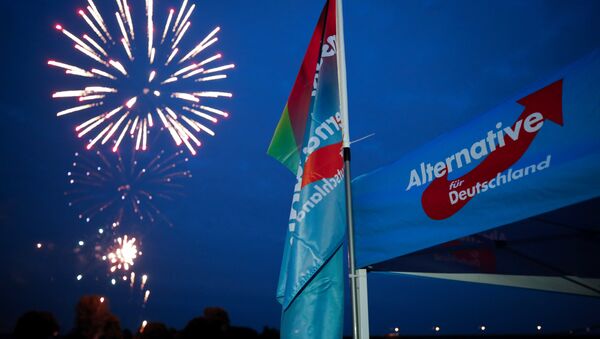In the East German state of Thuringia, representatives of Chancellor Angela Merkel’s conservative Christian Democrats (CDU) have controversially broken ranks with the party’s official line on power-sharing with Alternative fur Deutschland (AfD), with 17 party representatives signing a letter demanding higher-ups sanction coalition talks “all democratically elected parties”.
While the parliamentarians’ letter doesn’t mention AfD directly, the implication is clear, and breaches a firm official line adopted at the CDU’s 2018 conference.
Since then, Markus Soder, head of the CDU's Bavarian sister party CSU, has said even "chatting over coffee" with AfD representatives is verboten, while Merkel's successor as party leader, Annegret Kramp-Karrenbauer, has threatened to exclude members of the party for even entertaining the idea of cooperating with the upstart party.
— Jordan Stancil (@stancil_jordan) November 6, 2019
However, with coalition discussions struggling in Thuringia, AfD – which saw its vote share leap to 22.5 percent in the recent vote – may represent the only feasible way by which CDU can maintain its place in government in the state. Moreover, the open letter lambasts the notion of “almost a quarter of the voters…[staying] out of [coalition] talks" – although the prospect of the party’s state leader Bjorn Hocke holding high office was ruled out entirely.
"Coalitions with both [Die Linke and AfD] are impossible. However, everything in between must be discussed among democrats in order to fathom whether and how a stable government can be formed in Thuringia," the group wrote.
In response, CDU General Secretary Paul Ziemiak described the demands for talks with the AfD as "mad”.
"The opinion of the CDU has not changed. Period. End of the announcement," he said.
— World Elects (@ElectsWorld) November 6, 2019
Nonetheless, despite the CDU’s apparently inflexible stance on cooperation with AfD, the party’s rising popularity has neither gone unnoticed nor unrewarded in many parts of Germany. For instance, on the local council of Frankenstein in the West German state of Rhineland-Palatinate, CDU representative Monika Schirdewahn and her AfD husband Horst formed a faction of under the name "Progress Frankenstein”, while in Gorlitz, near the Polish border, AfD politician Norman Knauthe now leads the town’s Environment and Ordinance Committee.


